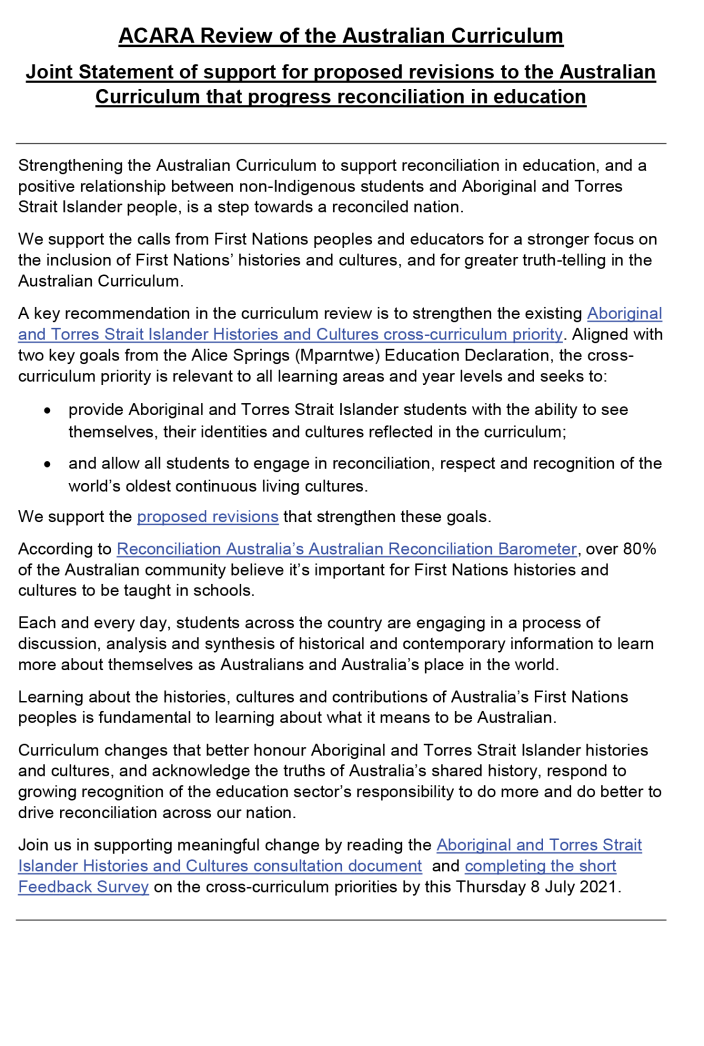
It’s fortunate that Australian Curriculum Assessment and Reporting Authority (ACARA) Chief Executive David de Carvalho and Chair Belinda Robinson welcomed “robust discussion” of their draft review of the National Curriculum. They got plenty.
“The Foundation to Year 10 Australian Curriculum outlines the core knowledge and skills to be taught to students, wherever they live in Australia,” ACARA said on its website in opening the review for public consultation in late April 2021.
“The Australian Curriculum Review looks to improve the curriculum by refining, realigning and decluttering the content so it focuses on the essential knowledge and skills students should learn and it is clearer for teachers on what they need to teach.”
The mission may sound simple enough. It’s anything but.
Media commentary
When the 10-week public consultation period on the proposed revisions ended on 8 July, the barrage of criticism included Graham Young, thundering in The Spectator magazine: “The national curriculum doesn’t just threaten our children. It’s a threat to the future of our nation.”
The politically conservative Institute of Public Affairs claimed a “tightknit gang of bureaucrats and academics” was attacking Western Civilisation and “cancelling the teaching of freedoms that underpin Australian democracy, including freedom of speech, association, and religion”.
News and current affairs website Crikey disagreed, saying politicians and interest groups were trying to frame the ACARA draft as “woke activists” teaching children to “hate Australia”.
Measured opinion
More moderate voices could also be heard. A group that included the Independent Education Union of Australia’s Acting Federal Secretary, Christine Cooper; the President of the Australian Education Union, Correna Haythorpe; and the Chief Executive of Reconciliation Australia, Karen Mundine, released a joint statement supporting the proposed revisions targeting reconciliation in education.
“We support the calls from First Nations peoples and educators for a stronger focus on the inclusion of First Nations’ histories and cultures, and for greater truth-telling in the Australian Curriculum,” the statement read.
It said strengthening the curriculum to support reconciliation in education would be “a step towards a reconciled nation”.
“Learning about the histories, cultures and contributions of Australia’s First Nations peoples is fundamental to learning about what it means to be Australian,” the statement said.
Gauging community views
The joint statement was informed by the Australian Reconciliation Barometer, a survey undertaken by Reconciliation Australia, the national body for reconciliation, established in 2001. Reconciliation Australia’s mission statement is to “promote and facilitate respect, trust, and positive relationships between the wider Australian community and Aboriginal and Torres Strait Islander students”.
The Australian Reconciliation Barometer measures attitudes towards reconciliation, using the five dimensions of reconciliation – race relations, equality and equity, unity, institutional integrity, and historical acceptance – to inform data collection and analysis.
The 2020 Reconciliation Barometer found that more than 80 percent of the Australian community believe “it’s important for First Nations histories and cultures to be taught in schools”. The barometer also revealed that:
- 91 percent of Aboriginal and Torres Strait Islander people (89 percent in 2018) and 83 percent of the general community (79 percent in 2018) believe it’s important for Aboriginal and Torres Strait Islander histories and cultures to be taught in schools
- 90 percent of the general community (86 percent in 2018) feel it is important for all Australians to learn about past issues, compared with 93 percent of Aboriginal and Torres Strait Islander people (91 percent in 2018).







































































































































